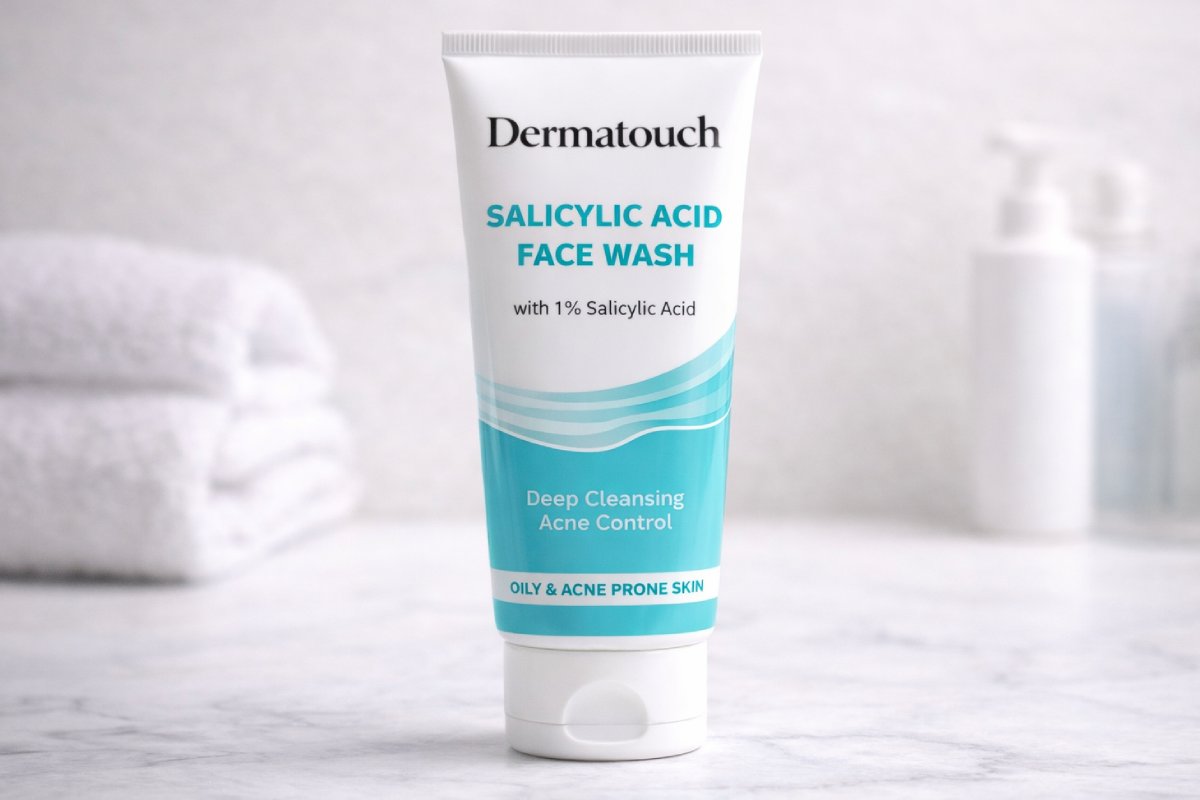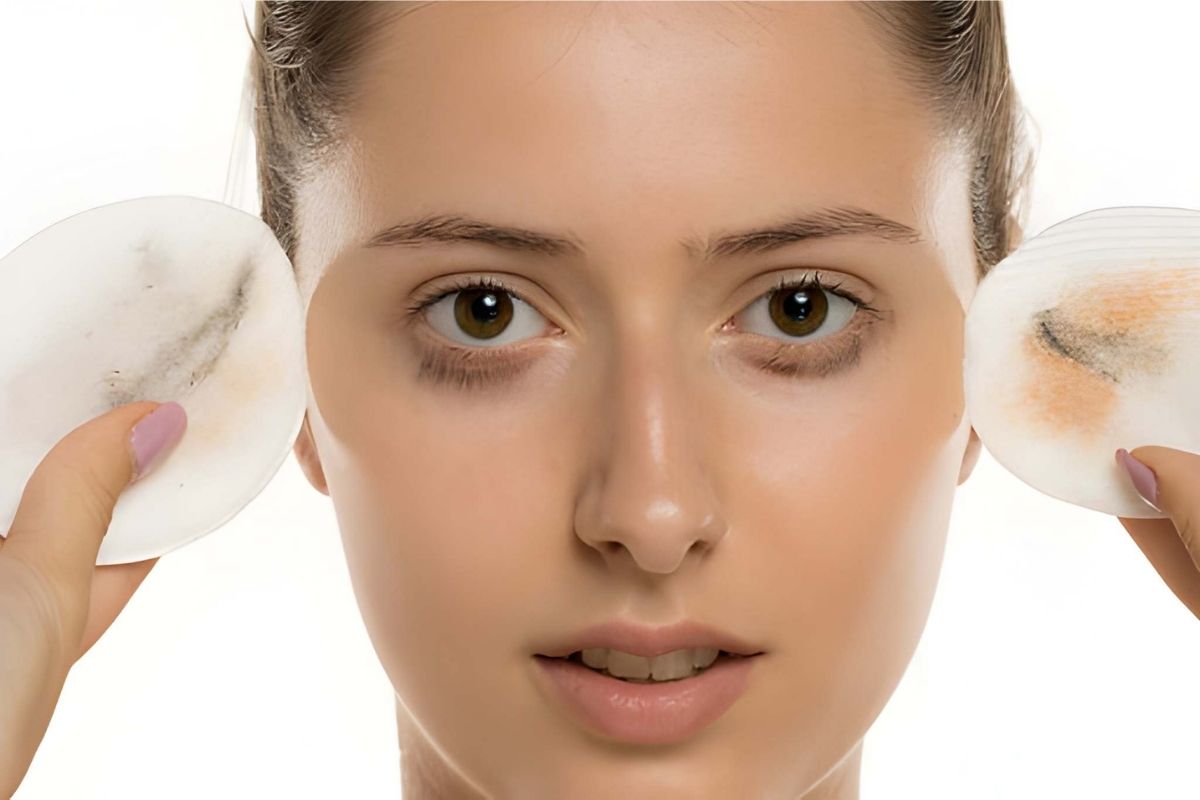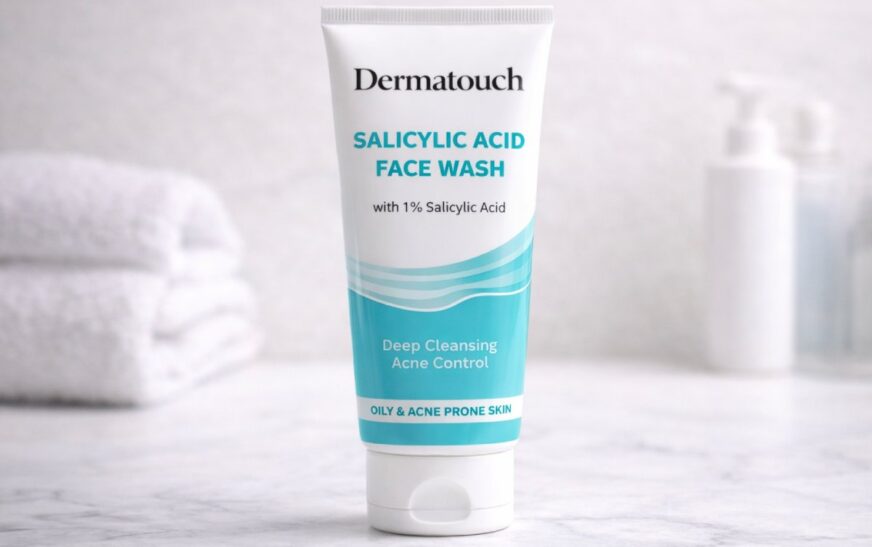If you’ve been searching for a face wash that actually understands Indian skin — the humidity, the pollution, the combination-skin chaos — Dermatouch face wash might already be on your radar. But is it worth the hype?
In this guide, we break down exactly what Dermatouch face wash does, who it’s for, how to use it correctly, and what dermatologists say about the ingredients inside.
What Is Dermatouch Face Wash?
Dermatouch face wash is a gentle, pH-balanced facial cleanser developed with dermatological testing. It is formulated to remove dirt, excess oil, sunscreen residue, and environmental pollutants — without disrupting the skin’s natural moisture barrier.
Quick Definition: A pH-balanced, dermatologist-tested face wash designed to cleanse deeply while keeping skin calm, hydrated, and irritation-free.
Unlike harsh foaming cleansers that leave your face feeling “squeaky clean” (which is actually a sign of over-stripping), Dermatouch aims to clean your skin while preserving its natural lipid layer.
Who Is Dermatouch Face Wash For?
Dermatouch face wash is best suited for:
- Oily and combination skin — controls sebum without causing rebound oil production
- Acne-prone skin — clears pores without aggressive drying agents
- Sensitive skin — fragrance-light formula reduces risk of irritation
- Beginners to skincare — simple, effective, no steep learning curve
- People in humid Indian climates — effective at cutting through sweat and pollution buildup
Who Should Avoid It?
- Those with severe cystic acne — a targeted acne treatment or prescription cleanser may be more appropriate
- People with extremely dry skin who need a cream or oil-based cleanser
- Anyone with a known allergy to any listed ingredient — always patch test first
Key Ingredients in Dermatouch Face Wash (And What They Actually Do)
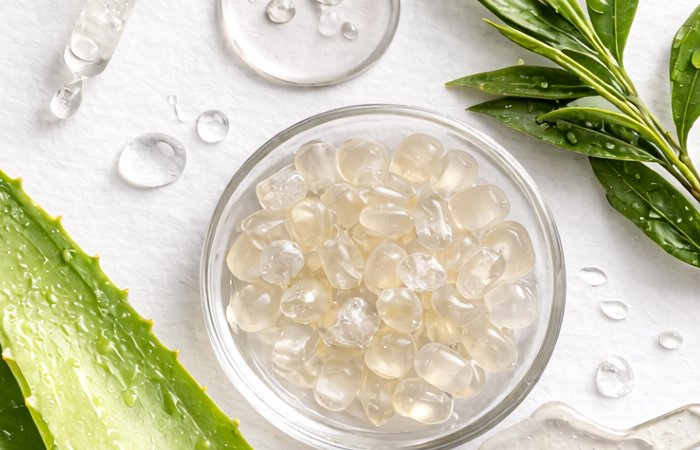
Understanding your cleanser’s ingredient list is the difference between skincare that guesses and skincare that works.
| Ingredient | Function | Skin Benefit |
|---|---|---|
| Salicylic Acid (BHA) | Exfoliates inside pores | Unclogs pores, reduces blackheads |
| Niacinamide | Brightening, anti-inflammatory | Reduces redness, evens skin tone |
| Aloe Vera Extract | Soothing, hydrating | Calms irritation post-cleanse |
| Glycerin | Humectant | Draws moisture into skin |
| Tea Tree Oil | Antimicrobial | Fights acne-causing bacteria |
| Zinc PCA | Sebum regulator | Controls shine throughout the day |
According to a 2024 study published in the Journal of Clinical and Aesthetic Dermatology, salicylic acid at concentrations of 0.5–2% is clinically effective at reducing comedonal acne within 4–8 weeks of consistent use. Dermatouch falls within this safe, effective range.
For a deeper understanding of how salicylic acid works in skincare formulations, Healthline’s expert-reviewed guide on salicylic acid is an excellent reference trusted by millions of readers globally.
Benefits of Dermatouch Face Wash
1. Deep Pore Cleansing Without Over-Drying The BHA complex penetrates oil-based debris inside pores, making it particularly effective for blackheads and whiteheads — without the tight, dry feeling that alcohol-heavy cleansers leave behind.
2. Controls Oiliness for 6–8 Hours Thanks to Zinc PCA, many users report noticeably reduced shine well into the afternoon — a significant advantage in India’s warm, humid climate where mid-day oil is a common complaint.
3. Calms Post-Workout or Post-Commute Skin Aloe vera and niacinamide in the formula actively soothe skin after exposure to heat, pollution, and sweat. This makes it a great choice for the evening cleanse after your commute or gym session.
4. Brightens Dull Skin Over Time Niacinamide — at 5% concentration as recommended by dermatologists — reduces hyperpigmentation and uneven tone with regular use over 8–12 weeks.
5. Suitable for Year-Round Use Unlike gel cleansers that may feel too stripping in winter, Dermatouch’s glycerin base maintains hydration even in cooler months.
Drawbacks and Honest Limitations
No product is perfect. Here’s what to keep in mind:
- Not a standalone acne treatment — it cleanses and supports, but active acne needs additional targeted treatments like benzoyl peroxide or retinoids
- Results take time — expect 4–6 weeks before significant improvement in texture or pore appearance
- May not be rich enough for very dry or dehydrated skin types
- Fragrance sensitivity — while low-fragrance, those with reactive skin should still patch test on the inner wrist for 24 hours
How to Use Dermatouch Face Wash Correctly (Step-by-Step)
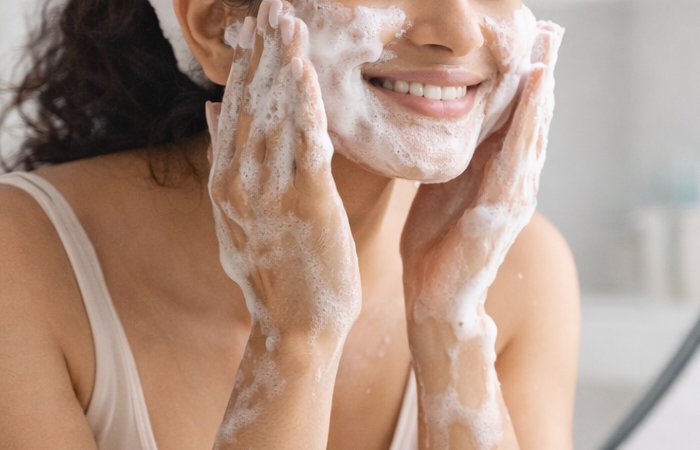
Getting the most out of your cleanser is all about technique.
Step 1: Wet your face with lukewarm water Hot water strips natural oils; cold water doesn’t effectively open pores. Lukewarm is the sweet spot.
Step 2: Dispense a 5–10p coin-sized amount Using too much product doesn’t mean better cleansing — it just creates excess lather that rinses down the drain.
Step 3: Apply in gentle circular motions for 60 seconds Most people rinse off their cleanser in 10–15 seconds. A full 60-second massage allows active ingredients like salicylic acid time to work on the pore surface.
Step 4: Rinse thoroughly with cool water Cool water helps close pores after cleansing.
Step 5: Pat dry — never rub Rubbing with a towel creates micro-friction that can irritate skin and worsen acne over time. Use a clean, soft towel and gently pat.
Step 6: Follow with toner and moisturizer within 60 seconds The “60-second rule” in skincare means applying your next step before skin fully dries to lock in hydration.
Recommended Frequency:
- Oily/acne-prone skin: Twice daily (AM + PM)
- Combination/normal skin: Once daily (PM) + gentle rinse in the AM
- Sensitive skin: Once daily (PM only)
Common Mistakes People Make With Face Washes (Including Dermatouch)
Mistake 1: Over-cleansing Washing your face 3–4 times a day disrupts the skin barrier and triggers more oil production — the opposite of what you want.
Mistake 2: Skipping moisturizer after cleansing Even oily skin needs moisturizer post-cleanse. Skipping it signals your skin to produce more oil to compensate.
Mistake 3: Using the wrong water temperature As noted above, hot water strips essential lipids. Lukewarm is always the answer.
Mistake 4: Storing face wash in the shower Heat and steam degrade active ingredients like salicylic acid faster. Store in a cool, dry place.
Mistake 5: Expecting overnight results Consistent, twice-daily use for at least 4 weeks is the minimum before judging any face wash’s effectiveness.
Myths vs Facts: Dermatouch Face Wash Edition
| Myth | Fact |
|---|---|
| “More lather = better clean” | Sulfate-heavy foams strip skin; low-lather formulas can cleanse just as well |
| “Face washes remove acne scars” | Cleansers cleanse — only actives like AHAs, retinoids, or vitamin C treat pigmentation |
| “Expensive face wash = better results” | Efficacy depends on ingredients and concentration, not price |
| “If it stings, it’s working” | Stinging indicates irritation, not effectiveness — stop using if you experience stinging |
| “One face wash works for all skin types” | Skin type dictates which cleanser ingredients are appropriate |
Dermatouch Face Wash vs Competitors: How Does It Compare?
| Feature | Dermatouch | CeraVe Foaming Cleanser | Minimalist Salicylic Cleanser |
|---|---|---|---|
| pH-balanced | ✅ Yes | ✅ Yes | ✅ Yes |
| Salicylic Acid | ✅ Yes | ❌ No | ✅ Yes |
| Niacinamide | ✅ Yes | ❌ No | ❌ No |
| Suitable for Indian humidity | ✅ Yes | Moderate | ✅ Yes |
| Price range (India) | ₹200–400 | ₹800–1200 | ₹300–500 |
| Availability | Online + offline | Online-heavy | Online-heavy |
For those comparing Dermatouch against globally recognized dermatologist-recommended cleansers, the American Academy of Dermatology’s face washing guide provides science-backed criteria for what an effective facial cleanser should deliver — making it a useful benchmark for any comparison.
Real-World Example: What 4 Weeks of Consistent Use Looks Like
Week 1: Skin may experience a brief purging phase as salicylic acid unclogs pores. Small breakouts may temporarily appear — this is normal.
Week 2: Purging subsides. Pores begin to appear smaller. Skin surface feels smoother.
Week 3: Noticeable reduction in mid-day shine. Skin texture improves visibly.
Week 4: Consistent brightness, reduced blackheads, and a more even tone — especially in the T-zone.
Note: Individual results vary based on overall skincare routine, diet, hydration, and skin type.
Expert Tips for Getting the Best Results
- Layer strategically: Use Dermatouch face wash → alcohol-free toner → niacinamide serum → lightweight moisturizer with SPF in the AM
- Don’t mix with harsh exfoliants on the same day — if you use a physical scrub or AHA toner, skip the second cleanse that evening
- Use a soft silicone cleansing brush once or twice a week to enhance the massage and ingredient absorption
- Keep a consistent routine — the #1 predictor of skincare results is consistency, not product switching
Final Verdict
Dermatouch face wash is a strong, well-formulated option for anyone dealing with oily skin, mild acne, or dullness — especially in Indian climate conditions. Its combination of salicylic acid, niacinamide, glycerin, and zinc PCA covers the key concerns of most Indian skin types in one affordable, accessible product.
It’s not a miracle cure, and it won’t replace a well-rounded skincare routine — but as a daily cleanser, it genuinely delivers on its core promise: clean, calm, clearer skin over time.
FAQs
Q1: Is Dermatouch face wash suitable for daily use? Yes. Dermatouch face wash is formulated for twice-daily use for oily and combination skin. Those with sensitive skin should use it once daily in the evening.
Q2: Can Dermatouch face wash remove makeup? It can remove light makeup and sunscreen residue, but for full-face makeup or heavy SPF, use a dedicated micellar water or cleansing oil as a first cleanse before using Dermatouch.
Q3: Does Dermatouch face wash lighten skin? It does not bleach or lighten skin. However, the niacinamide content can help reduce dark spots and uneven tone over 8–12 weeks of consistent use, leading to a brighter appearance.
Q4: Can I use Dermatouch face wash if I have sensitive skin? Yes, with caution. Patch test on your inner wrist for 24 hours before applying to your face. Use once daily in the evening initially to assess tolerance.
Q5: How long before I see results with Dermatouch face wash? Expect visible improvement in pore size and shine control within 2–3 weeks. Significant texture and tone improvement typically appears at the 4–6 week mark.
Q6: Is Dermatouch face wash cruelty-free? Check the latest product packaging or the brand’s official website for the most current cruelty-free and vegan certification status, as this can change with product reformulations.
Q7: Can teenagers use Dermatouch face wash? Yes. The formula is appropriate for teenagers dealing with hormonal acne or excess oil. Adult supervision is recommended for children under 12.
Final Conclusion
Building a skincare routine that actually works starts with one non-negotiable step: getting your cleanser right. Dermatouch face wash earns its place as a go-to daily cleanser for oily, combination, and acne-prone skin — especially for those navigating India’s demanding climate. With clinically relevant ingredients, an accessible price point, and visible results within 4–6 weeks, it’s a smart foundation for anyone serious about healthier, clearer skin.
Start with the right cleanser, stay consistent, and let the results speak for themselves.
Disclaimer: This article is for informational purposes only and does not constitute medical advice. Consult a dermatologist for personalized skincare recommendations.


